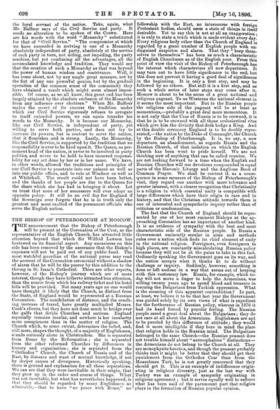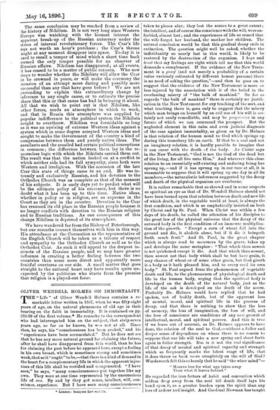THE BISHOP OF PETERBOROUGH AT MOSCOW. T HE announcement that the
Bishop of Peterborough will be present at the Coronation of the Czar, as the representative of the English Church, has attracted little attention beyond that which Sir Wilfrid Lawson has bestowed on its financial aspect. Any uneasiness on this side has been removed by the assurance that the Bishop's expenses will not be paid out of any public fund. The most watchful guardian of the national purse may read the account of the Coronation ceremonial without a shadow of alarm that he will be the poorer by this addition to the throng in St. Isaac's Cathedral. There are other aspects, however, of the Bishop's journey which are of more interest, though they have hitherto attracted less attention, than the source from which his railway ticket and his hotel bills will be provided. Not many years ago no one would have thought it likely that the Church, as distinct from the State, of England would be represented at a Russian Coronation. The annihilation of distance, and the result- ing increase of travel, have greatly multiplied Messrs. Cook's clients, but they have not done much to bridge over the gulfs that divide Churches and nations. England especially remains insular, and nowhere is her insularity more conspicuous than in the matter of religion. The Church which, to some extent, determines the belief, and, still more, shapes the thought, of a majority of Englishmen, stands curiously alone in Christendom. She is separated from Rome by the Reformation ; she is separated from the other reformed Churches by differences in history and organisation ; she is separated from the " Orthodox " Church, the Church of Russia and of the East, by distance and want of mutual knowledge, if not by deeper causes of divergence. Historically speaking, there is ground and explanation for all these separations. We can see that they were inevitable in their origin, that they grew up in the order and course of things. What was not inevitable, but what has nevertheless happened, is that they should be regarded by many Englishmen as admirable,—that to have "no peace with Rome," no fellowship with the East, no intercourse with foreign Protestant bodies, should seem a state of things in itself desirable. Yet to say this is not at all an exaggeration ; it is only to state a truth which is made evident every day. Every religious body other than the Church of England is regarded by a great number of English people with un- disguised suspicion and alarm. That they " keep them- selves to themselves " has been as much a. characteristic of English Churchmen as of the English poor. From this point of view the visit of the Bishop of Peterborough has the interest which characterises all new departures. It may turn out to have little significance in the end, but this does not prevent it having a good deal of significance in the beginning. It is only a first step, and may be followed by no others. But still it is a first step, and as such a whole series of later steps may come after it. Moscow is about to be the scene of a great national and religious pageant. To us Westerns the national element in it seems the most important. But to the Russian people the religious side of the pageant will be at least as momentous,—probably a great deal more momentous. It is not only that the Czar of Russia is to be crowned, it is that he is to be crowned with all those ecclesiastical rites which give him the divinity that doth hedge a King. And at this double ceremony England is to be doubly repre- sented,—the nation by the Duke of Connaught, the Church by the Bishop of Peterborough. It is, we say, a new departure, an abandonment, as regards Russia and the Russian Church, of that isolation on which the English Church has been wont to pride herself. We are not thinking now of anything that can be called reunion. We are not looking forward to a time when the English and Russian Churches will use devotions compounded in equal parts of the Slavonic Liturgy and the Anglican Book of Common Prayer. We shall be content if, as a conse- quence in some measure of the Bishop of Peterborough's visit, they regard one another with more tolerance and greater interest, with a clearer recognition that Christianity is a religion in which essential unity is compatible with large differences which have their origin in race and in history, and that the Christian attitude towards them is one of interested and sympathetic inquiry rather than of criticism or condemnation.
The fact that the Church of England should be repre- sented by one of her most eminent Bishops at the ap- proaching Coronation has an importance of another kind. It is an evidence of sympathy with the best and most characteristic side of the Russian people. In Russia a Government eminently secular in aims and methods rules over a nation which finds its chief element of unity in the national religion. Foreigners, even foreigners in high places, are constantly miscalculating Russian policy because they will not be at the pains to take in this fact. Ordinarily speaking the Government goes on its way, and the nation accepts what it thinks fit to do without challenge or inquiry. Suddenly, however, something is done or left undone in a way that seems out of keeping with this customary law. Russia, for example, which to- day will not move a finger to help the Armenians, was willing twenty years ago to spend blood and treasure in rescuing the Bulgarians from Turkish oppression. What is the meaning of this apparent contradiction ? In part, at least, we believe it to be that last year the Government was guided solely by its own views of what is expedient for the furtherance of Russian policy, whereas in 1876 it had its hand forced by popular feeling. The Russian people cared a great deal about the Bulgarians ; they do not care at all about the Armenians. Englishmen are apt to be puzzled by this difference of attitude ; they would find it more intelligible if they bore in mind the place that religion holds in the Russian mind. The Bulgarians belonged to the same Church—the Russian peasant does not trouble himself about "autocephalous " distinctions— the Armenians do not belong to the Church at all. They are monophysite heretics, and though the peasant probably thinks tnat it might be better that they should get their punishment from the Orthodox Czar than from the Mussulman Turk, he is not greatly concerned that they should get it. This is an example of indifference origin- ating in religious diversity, just as the last war with Turkey was an example of sympathy originating in religious agreement ; but it serves equally well to enforce what has been said of the paramount part that religion plays in the formation of Russian popular opinion. The same, conclusion may be reached from a review of the history of Nihilism. It is not very long since Western Europe was watching with the keenest interest the apparent break-up of the Russian autocracy under the stress of internal revolutionary forces. The Czar's life was not worth an hour's purchase ; the Czar's throne night at any moment disappear into space. To-day it is card to recall a temper of mind which a short time back seemed the only temper possible for an observer of Russian affairs. Nihilism has disappeared; at all events, It has ceased to be a matter of public concern. Who now stops to wonder whether the Nihilists will allow the Czar to be crowned in peace, or will make the ceremony the xcasion of an attempt more daring and possibly more successful than any that have gone before ? We are not pretending to explain this extraordinary change by reference to any single cause, or to estimate the precise share that this or that cause has had in bringing it about. All that we wish to point out is that Nihilism, like other forces, needs an atmosphere in which to work, and that in Russia this atmosphere was supplied by popular indifference to the political system the Nihilists sought to overthrow. Nihilism was formidable so long as it was an uprising of extreme Western ideas against a system which in some degree accepted Western ideas and sought to make the Government of the country a kind of compromise between them and purely native ideas. The assailants and the assailed had certain political conceptions in common ; the difference between them lay in the re- morseless logic with which the Nihilists carried them out. The result was that the nation looked on at a conflict in which neither side had its full sympathy, since both were Western and irreligious. With the accession of the late Czar this state of things came to an end. He was in- tensely and exclusively Russian, and his devotion to the Orthodox Church was as complete as that of the meanest of his subjects. It is early days yet to predict what will be the ultimate policy of his successor, but there is no doubt what it has been up to this time. Native ideas, whether in policy or in religion, are as supreme in the Court as they are in the country. Devotion to the Czar has resumed its old place in the Russian people because it no longer conflicts with devotion to the Russian religion and to Russian traditions. As one consequence of this change Nihilism is deprived of its atmosphere.
We have wandered far from the Bishop of Peterborough, but our remarks connect themselves with him in this way. His attendance at the Coronation as the representative of the English Church will be taken as a tribute of respect and sympathy to the Orthodox Church as well as to the Orthodox Czar. As such it will appeal to the deepest in- stincts of the Russian people, and so may have greater influence in creating a better feeling between the two countries than some more direct and apparently more fruitful overtures on our side. A small matter that goes straight to the national heart may have results quite un- expected by the politician who starts from the premiss that religion is a played-out force.







































 Previous page
Previous page